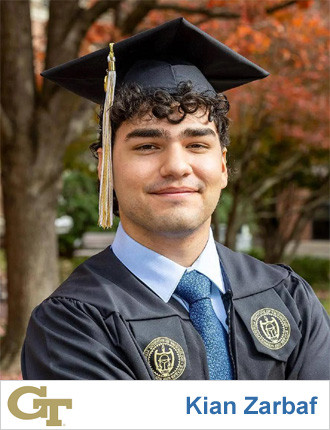
When Kian Zarbaf applied to Georgia Tech, he laid out 3 goals in his application essay: join the Yang Aero Maker Space, do research in the Ben T. Zinn Combustion Lab, and find an internship at a big space company such as Blue Origin or SpaceX.
Check. Check. And check.
Zarbaf admits he didn’t necessarily keep track of those goals and intentionally set out to achieve them. It just turns out he knew pretty well what he wanted to accomplish in college when he was just 18 years old.
Four years later, Zarbaf is going even further. He’s headed back to his home state of Florida in the new year to work at SpaceX, where he’ll play a key role in the launches that send satellites, cargo, and astronauts to space.
As usual, Zarbaf is right where the action is.
“I always want to be where it’s booming,” said Zarbaf, a College of Engineering Clark Scholar who is finishing his aerospace engineering degree this fall. “It’s kind of stressful, but I like the commotion.”
That’s what drew him to research in the combustion lab, first with Adam Steinberg’s lab and now in Wenting Sun’s group. Zarbaf has been involved in projects using laser diagnostics to assess new electric thruster designs and optimizing combustion of alternative fuels, like ammonia, to reduce carbon emissions.
“The lab had this air around it that it was the most innovative place for propulsion development, and that was just calling my name,” Zarbaf said. “It was the combination of wanting to work with combustion and engines, and I had this feeling: I will learn so much. I’ll be at the forefront of the newest of the new.”
The Miami-area native originally thought he wanted to create the newest thing for more Earth-bound conveyances. He loved cars, engines, F1 racing, and design. He initially picked aerospace engineering because he thought learning about aerodynamics would fuel his engineering passion for four-wheeled vehicles.
Instead, he fell in love with rockets and the imaginative vehicle and engine designs of emerging commercial space companies.
He joined the Yang Aero Maker Space, where he became a mentor and helped integrate new tools and machines into the space.
He also joined Georgia Tech Experimental Rocketry, a division of the Ramblin’ Rocket Club. Zarbaf knew next to nothing about propulsion initially, but he jumped in. Before long, he was leading the club’s propulsion team, helping shift from 4-inch motor designs to 6-inch designs that produced double the power for the group’s two-stage rockets. He oversaw multiple successful static-fire tests — and he found a group of people who would work incredibly hard to accomplish their shared goals.
Student groups are really where the magic happens — and also where you meet your people,” Zarbaf said. Whether it was machining parts at 6 a.m. before classes or pressure testing designs late into the night during a rainy Georgia spring, Zarbaf said he found in his rocket club teammates the same drive he saw elsewhere at Georgia Tech.
“The people that come here have grit like you don’t get anywhere else. I’ve been in workplaces; I’ve met people from other engineering schools on competition teams. People here grind like no other. They will always find a solution to something, and that’s admirable.”
Zarbaf leveraged the hands-on propulsion work with the club and his experiences in the Aero Maker Space to land an internship at Blue Origin in Spring 2022. The company is developing reusable rockets, including the New Shepard vehicle to take small experiments and astronauts to space. Zarbaf worked on testing elements of the reaction control system used to orient the craft before they were installed.
Initially, he helped develop the testing regimen. Then he got hands-on in the crew capsule with the actual testing, developing documentation and procedures for his team. He ended up staying through the summer to finish the testing cycle.
“It felt like a dream,” he said.
It went well enough that he went back this summer, working with the test and launch engineering team on launchpad systems and engine test stands.
Zarbaf likely could’ve stayed with Blue Origin after he finished his degree, but he had the chance to go back to Florida, just a few hours north of home, to work with SpaceX on the systems that fuel rockets before launch.
“I will be in the motions for every single launch,” he said. “I’m going to be part of it and have direct, visible impact on what’s happening. That’s amazing.”
It’s a chance to — once again — be right at the edge of the frontier. Where, in Zarbaf’s words, it’s booming.